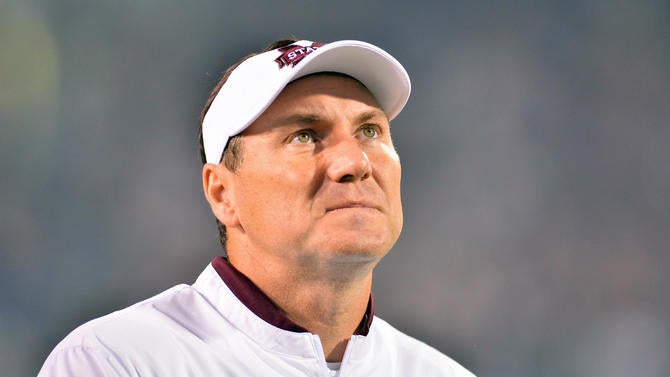DESTIN, Fla. -- The images are jarring. There on video is Mississippi State five-star recruit Jeffery Simmons standing over a woman already on the ground and punching her several times in the face.
Police charged Simmons, an elite high school defensive end who chose Mississippi State over Alabama and Ole Miss, with simple assault. Two days after the video went viral in March, Simmons apologized on Facebook: "My apology goes out to the Taylor Family and especially to Sophia Taylor [the woman he hit]. What was I thinking? Honestly, I wasn't thinking, all I could think was this is my family and I'm supposed to defend my family. ... I truly hope that you will find it in your hearts to forgive me for my actions."
For two months, Mississippi State has remained silent on whether Simmons will be allowed to enroll when summer classes start Thursday. Mississippi State coach Dan Mullen said Tuesday that the university will comment on Simmons' status later this week. When asked what his reaction was seeing the video of Simmons hitting a woman on the ground, Mullen replied, "I'm not commenting on any of that at this time."
Don McPherson, a College Football Hall of Fame quarterback at Syracuse, has prominently spoken out for three decades about sexual and domestic violence. He has warned coaches for several years that they are becoming more accountable over who they bring to campus because of Title IX requirements related to investigating sexual violence and harassment.
"Here's what you do [with Simmons]: Would admissions admit that student? And the answer is no, so why should athletics?" McPherson said. "As soon as athletics has an admissions policy that is so deviant from the general campus, you have problems."
Or to put it another way from McPherson: "If coaches don't wake up, you're going to find more coaches just like Art Briles. The whole notion of second chances as Nick Saban tried to say -- and I like Nick a lot and believe he cares -- but all of these guys have these savior complexes. They think they can give a player a second chance and help him out and that's going to be a bigger risk in this environment."
Mullen said he uses no hard-and-fast rule for disciplining players. He once dismissed Justin Cox after he was arrested for domestic violence and recently kept Anfernee Mullins on the team after a simple assault charge. Mullen said he generally views someone convicted of a felony as a serious offense. Police charged Simmons and other people with simple assault -- a misdemeanor -- and he has a court date set for June 14.
"I think we want to be as fair as we can to student-athletes in making sure we're not taking opportunities away from people who deserve opportunities," Mullen said, "but also not making decisions without impacting other students' safety or bringing in people that might not be great for the university on the campus."

Tennessee faces its own problems. Eight women are suing the university in a Title IX lawsuit in which they claim the athletics department created a hostile environment and favored athletes, particularly football, in its investigations of sexual assaults and student judiciary process.
Former Tennessee wide receiver Drae Bowles said in an affidavit that he was attacked by teammates for helping a woman who said she was sexually assaulted by two Vols players. Bowles said that coach Butch Jones told him he "betrayed the team" by helping the woman, accusations that Jones has vehemently denied.
"I feel strong as everyone in our organization that we've done the right things," Jones said. "I'm proud of the culture that we've built and we've tried to do everything the right way."
The SEC is discussing a proposal this week that would redefine its player misconduct rule for transfers. Currently, "serious misconduct" by a transfer is defined as a player subject to university or athletic department disciplinary action for domestic violence, sexual assault or other forms of sexual violence.
The SEC may expand "serious misconduct" to include any transfer who has been convicted, pled guilty or pled no contest to a felony involving serious misconduct. Also, the types of offenses would expand to include "dating violence or stalking, or conduct of a nature that creates serious concerns about the safety of others."
SEC commissioner Greg Sankey said the rule doesn't apply to incoming recruits because legal records may be harder to obtain for minors, transfers are generally of age and previously were in a higher educational setting, and youthful mistakes may happen for minors.
"Things are going to happen after signing day, and I know where you guys are swimming," Arkansas coach Bret Bielema said. "Again, that decision is probably a lot bigger than me. I'm not saying my entire career I've recruited all angels, but I definitely know to stay away from certain situations."
Jones and Bielema said they don't use private investigators to examine the pasts of recruits. McPherson said the reality is background checks of some extent usually get done on recruits and there's not much information college coaches don't know about them.
"I mean, they start recruiting some kids in middle school," McPherson said. "It's a matter of what kind of resources are they providing these kids when they get to campus. For the ones that are at risk, you better provide a lot of resources to support him."
The SEC transfer rule was created last year after Alabama coach Nick Saban signed defensive lineman Jonathan Taylor, who had been dismissed by Georgia after being indicted on two felony counts for hitting and choking his girlfriend. Taylor was later dismissed by Alabama after he was arrested for another incident with a female.
Saban said Alabama asks 13 questions about recruits to guidance counselors, principals, high school coaches and other people who have relationships with the player.
"You try to get some character questions answered," Saban said. "You don't know if you're getting the truth. But we also ask the players specific questions like, 'What do you think you need to do to be a good college football player?' If the guy says nothing, that should set off a alarm. I've had that happen before. I think we do the best we can. I don't know that it's a perfect circumstance."
Alabama athletic director Bill Battle defended Saban's approach of giving second chances to troubled athletes.
"All coaches think they can save everybody, and Nick has had great success in taking players in history, and some of them have done well and some haven't," Battle said. "But probably more than not he has been able to change behavior. I think that's part of his DNA. All of us believe in second chances.
"Now at some point, it's probably not worth the risk of taking that. In my opinion, he has raised the bar in my mind in everything that he has touched around the university. He can get criticized for certain things, but if you go back and look, there are cases where he's done well and succeeded in cases similar to [Taylor]. So, you can't win 'em all."
McPherson has been warning coaches since 2011 that a situation like Briles getting fired was coming. Why 2011? Because that's the year the Office of Civil Rights (OCR) sent its famous "Dear Colleague" letter to colleges across the country reminding them of the Title IX requirements related to sexual violence and harassment that schools must adhere to as federally funded universities.
The OCR reduced the burden of proof required for colleges to take action to less than what's needed for criminal convictions. The letter described specific ways that colleges must address prevention and accusations of sexual violence so claims are investigated swiftly and appropriately.
"If there's any message these coaches should take out of Baylor, it's that their self-absorbed way of looking at their sport because they can put 100,000 people into the stadium is a liability to the institution if they do not look at their students the same way that admissions looks at all students," McPherson said.
The SEC transfer rule provides cover as much for the coach who kicks out a player as it does for the new coach who would have signed him, McPherson said. In other words, a coach can get protected by kicking out a player for misconduct without fans getting upset because the player goes on to another SEC school.
The SEC plans to require schools to ask a minimum of these five questions of transfers if there's no independent reason to suspect a previous serious misconduct:
- Do you have criminal charges against you?
- Have you been convicted of, pled guilty to, or pled no contest to any crime involving: a. Acts of a violent or sexual nature in the past? b. Possession or use of a firearm? c. Dating violence? d. Stalking? e. Other felony crime?
- Have you inflicted or attempted to inflict serious physical injury on another, or engaged in any violent acts toward another?
- Have you been disciplined, suspended or placed on probation for any reason (excluding limited discipline applied by a sports team) at any previous post-graduate school, two-year college or four-year college or university?
- At the time you left your previous institution, were you the subject of a pending proceeding of any sort that could have resulted in disciplinary measures, suspension, expulsion or probation? Are you currently the subject of this kind of proceeding at your current institution?
Sankey said an SEC working group determined those questions should be asked because the SEC transfer rule set off questions about conference members handling cases differently when trying to learn about past behavior.
When McPherson was read the questions, he immediately laughed. It's not because they're questions that shouldn't be asked, but rather because of what he says they represent.
"That's legal due diligence just like the whole consent movement on college campuses now about did you have consent (for sex) and whether there was a verbal understanding," McPherson said. "If you have to be told to ask these series of questions about athletes, then you haven't done the due diligence you say you've been doing all these years."
Bielema said he had a situation this year with the new SEC rule in which he inquired about a transfer from a Big Ten school. The player had an unresolved issue regarding consensual sex, "and I was told no and I just dropped it," he said. "I think anytime there's some well-documented physical things toward women it's not a choice, it's the only thing you have to be able to do. For those who don't believe in that, you don't have much of a leg to stand on."
Bielema recalled a moment at the SEC meetings two years ago when then-Missouri coach Gary Pinkel remarked that coaches just need to do what's right.
"I thought that was a cool moment for me," Bielema said. "I'm not a father yet, but a lot of those guys in the room are and he was just trying to make the point that at some point it's not about the overall winning. It's just about making the right decisions."
If it's not clear already, Briles' firing should be a wake-up call to coaches and university presidents. Football may be extremely popular, but these coaches and presidents are on the hook more than ever over who they bring to campus.
"I read in the paper that if every coach, administrator and player doesn't read the full Baylor report they've got their head in the sand, and I think that's right," Battle said. "I think we all better take a look at that."
Mississippi State is just the latest school on the clock. There will be more. There always are.





















